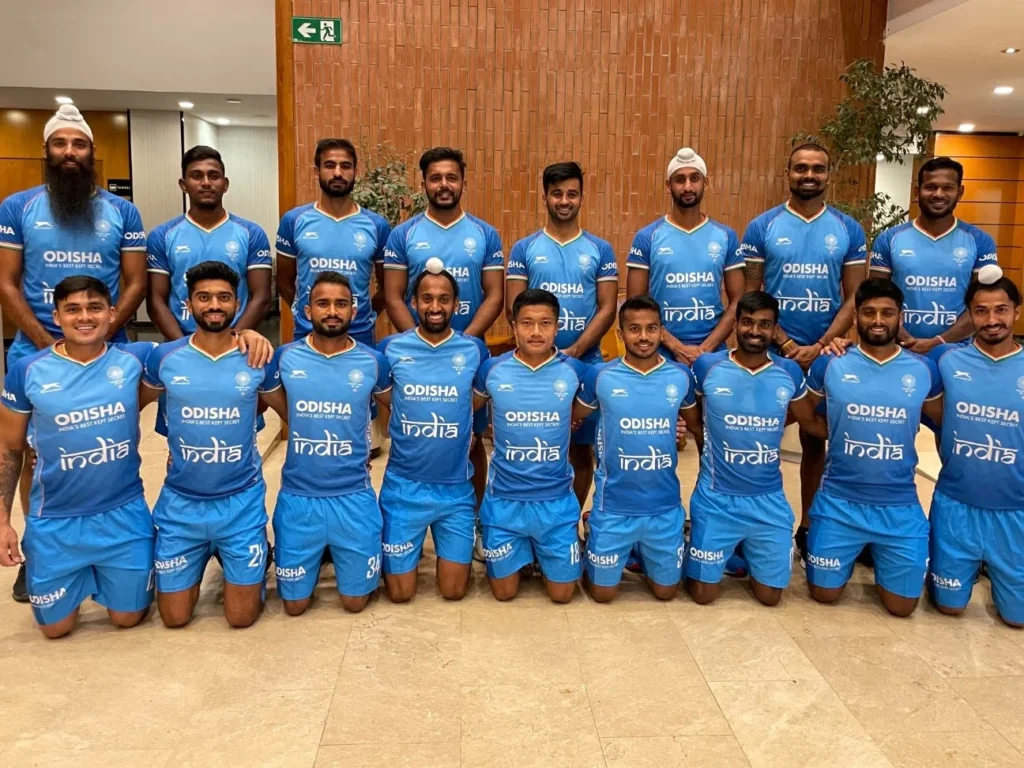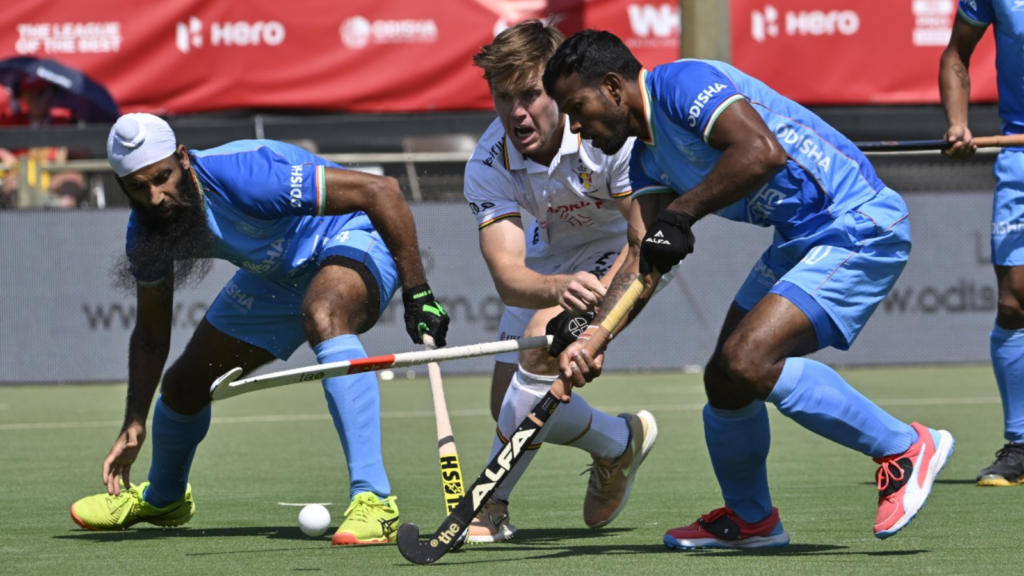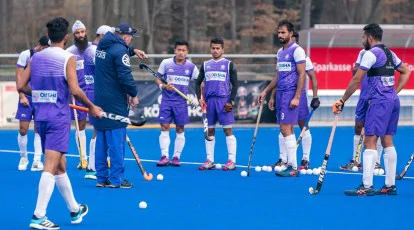In a shocking and sobering development for Indian hockey, the men’s national team has hit its lowest point in recent memory, recording a seventh consecutive defeat in the FIH Pro League after being outclassed by Belgium 6-3 in Antwerp. This string of losses marks the longest-ever losing streak in India’s rich hockey history, eclipsing the six consecutive defeats suffered during the 2012 London Olympics — a campaign long considered the nadir of Indian hockey.
Yet, unlike the disastrous 2012 outing that showcased a team utterly out of depth and disconnected, the current squad under head coach Craig Fulton is not devoid of talent or intent. Instead, it’s a team showing moments of brilliance only to collapse under pressure, repeating the same mistakes and paying the price for lapses in concentration and discipline.

India-Team-doing-photo-shoot
Fulton’s Fury and Momentary Resurgence
Craig Fulton’s frustration was unmissable — his fiery mid-match interview, complete with an uncharacteristic profanity on live television, reflected the tension simmering within the Indian camp. “We are here to win, not to lose,” he thundered, before immediately apologizing. But the emotion behind the outburst captured the gravity of the moment.
And for a brief moment after halftime, his words seemed to work.
India, trailing 0-2 at the break, came out with renewed energy. Within seconds, Dilpreet Singh pulled one back after a rebound off a penalty corner. Ten minutes later, Mandeep Singh’s fortunate deflection levelled the score at 2-2, setting up what appeared to be a classic comeback.
However, the momentum was short-lived. Belgium struck back in the 49th minute and from that point on, India’s structure unraveled. In chasing the equalizer, they exposed the backline, and Belgium — masters of transition and counter-attack — punished them ruthlessly, scoring three more in the final seven minutes.
A Story of Near Misses and Narrow Margins
What makes this losing streak even more perplexing is that six of the seven defeats have come by just a one-goal margin. Far from being blown away, India has often matched opponents for long stretches, only to falter in crucial phases of the game. These close losses reflect a team that’s competitive but lacks composure in decisive moments.
Saturday’s loss to Belgium, however, was different. The final scoreline of 6-3 highlights a defensive breakdown and a tactical miscalculation in the dying minutes. From 2-2 to a 6-3 collapse, India once again showed fragility under pressure — a pattern that has haunted them throughout the tournament.
Slow Starts and Defensive Lapses
India’s issues begin early. Once again, they were slow off the blocks, with a defensive lapse right from the opening whistle. Goalkeeper Suraj Karkera was seen behind the post arranging equipment when Belgium took the opening pushback. The lack of readiness allowed Belgium to push the ball deep into Indian territory almost unopposed. A short corner was conceded just 13 seconds into the match.
Although Karkera saved the initial drag-flick from Alexander Hendrickx, he parried the ball straight into the danger zone, and Arthur van Doren made no mistake in converting the rebound. Within a minute, India had faced three shots on goal — a staggering indicator of Belgium’s aggression and India’s passivity.
Fulton’s demand for “controlled aggression” was nowhere to be seen. The first quarter ended with India not even entering Belgium’s ‘D’ — a damning statistic.
The second goal came just before halftime as Hendrickx slipped one through Karkera’s legs. Belgium’s grip on the match was as tight as their defensive structure, and India looked rattled going into the break.
India’s Desperate Gamble Backfires
Post the halftime dressing-down, India looked momentarily transformed. But once Belgium regained the lead at 3-2, India gambled, throwing bodies forward in hope. The urgency turned into chaos. Instead of calm possession and structured buildup, India played with frustration, leaving gaping holes behind — exactly what Belgium needed.
Veteran Tom Boon orchestrated Belgium’s charge. His intelligent playmaking and control over the midfield ensured that every Indian mistake was punished. The final three Belgian goals were less about individual brilliance and more about India’s collective collapse.
A Record No One Wanted
This seventh defeat sets a grim milestone — the longest losing streak in Indian men’s hockey history. Even in 2012, there was some grace in the complete rebuild that followed. Now, this streak comes at a time when the team is packed with Olympic bronze medallists, promising youngsters, and a well-regarded coaching staff. The expectations were higher. The fall has, therefore, been even harder.
The loss also all but ends India’s hopes of finishing strong in the Pro League. Their final match — also against Belgium — now becomes a mere formality rather than a redemption arc. Worse, had Ireland not performed worse, India might have even risked relegation to the lower “plate” division of the global league.

India-attacking-and-Belgium-are-snatching-the-ball
What Lies Beneath the Surface?
So what’s gone wrong?
The answer isn’t straightforward. The Indian team is not lacking in fitness, skill, or experience. However, there’s a visible mental fragility, especially when playing from behind. In close games, experienced players are making rookie errors — mistimed tackles, misjudged passes, poor game management.
Leadership on the field also seems scattered. While players like Harmanpreet Singh and Mandeep Singh continue to perform in bursts, the team lacks a vocal, commanding presence who can steer momentum and settle nerves in tight moments.
Moreover, Fulton’s tactical approach — emphasising pressing and transition — requires precision and discipline. Yet, India continues to look out of sync, either pressing too high without cover or sitting back too deep without counter-attacking intent.

Coach-Explaning-to the-players-before-the-Match
Hope Amid Despair?
Despite the defeats, it’s important to acknowledge that India hasn’t been completely outclassed. They’ve competed, shown heart, and stayed in games — sometimes for 50 or 55 minutes — before letting it slip. The narrow margins suggest the team isn’t far off, but without course correction, those margins will keep piling losses.
Fulton, despite his visible frustration, still enjoys the backing of the players and the management. But both must now urgently focus on mental resilience, sharper starts, and late-game decision-making — the areas consistently costing India matches.
Looking Ahead
With the Paris Olympics around the corner and the 2026 World Cup not far behind, India cannot afford to let this streak define them. It must instead serve as a wake-up call.
The Pro League was meant to be a platform to fine-tune combinations, build confidence, and earn crucial ranking points. Instead, it’s become a reminder of vulnerabilities — mental, tactical, and strategic.
The challenge now is to learn from this stretch, not bury it. Indian hockey has risen from worse. But if the trend isn’t reversed quickly, the promise of a golden generation may remain unfulfilled.
Click here to watch more!



















Comments